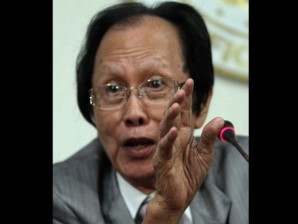SALN waiver doesn’t cover dollar accounts, says Cuevas
Ombudsman Conchita Carpio Morales violated the “absolute confidentiality” clause of a law on foreign currency accounts when she presented to the Senate impeachment court documents on the alleged $12-million bank deposits of Chief Justice Renato Corona, the defense panel said Wednesday.
Serafin Cuevas, Corona’s lead counsel, said the waiver in the statement of assets, liabilities and net worth (SALN) which Morales argued authorized the Office of the Ombudsman to obtain documents pertaining to a government employee’s personal wealth, did not cover dollar accounts.
Cuevas said the declaration in the SALN, which Morales claimed gave the Ombudsman “blanket authority” to investigate Corona’s purported dollar accounts, was not tantamount to a waiver as stipulated in Republic Act No. 6426, or the Foreign Deposits Currency Act.
“They claim that’s a waiver, but that is not the ‘consent’ referred to under the law. It’s very specific to foreign currency deposits as what is discussed in RA 6426,” Cuevas told reporters.
“So the waiver in there (only) refers to the contents of the SALN,” he added.
Article continues after this advertisementA clause in a regular SALN states, “I hereby authorize the Ombudsman or his duly appointed representative to obtain and secure from all appropriate government agencies, including the Bureau of Internal Revenue, such documents that may show my assets, liabilities, net worth, business interests and financial connections.”
Article continues after this advertisementBut Cuevas, a retired Supreme Court associate justice, maintained that such declaration was “not enough authority that is the ground for the revelation of all these things.”
‘Absolutely confidential’
“That is a legal problem. The (foreign currency accounts) are absolutely confidential and may not be inquired into and investigated by any person or public officials. It’s absolute,” the lawyer said.
Asked if Morales broke the law, Cuevas replied: “Yes, that was our point. There was a violation.”
“The waiver in foreign currency deposits, as mandated by law, should be applied stringently because you have to protect the confidentiality of the deposits. That should be in line with the purpose of the law,” said Rico Paolo Quicho, a defense spokesperson.
He stressed that foreign-denominated accounts may only be scrutinized “if there is a valid court order or a formal investigation” of the Anti-Money Laundering Council (AMLC).
Said Quicho: “In the case of the Chief Justice, there is no formal investigation (of the AMLC) or any court order. And notwithstanding the TRO (temporary restraining order) of the Supreme Court, they still presented the documents. So the purpose really is to pin down the Chief Justice.”
The TRO was issued upon petition by Philippine Savings Bank, and the senators later voted to respect the court directive.
